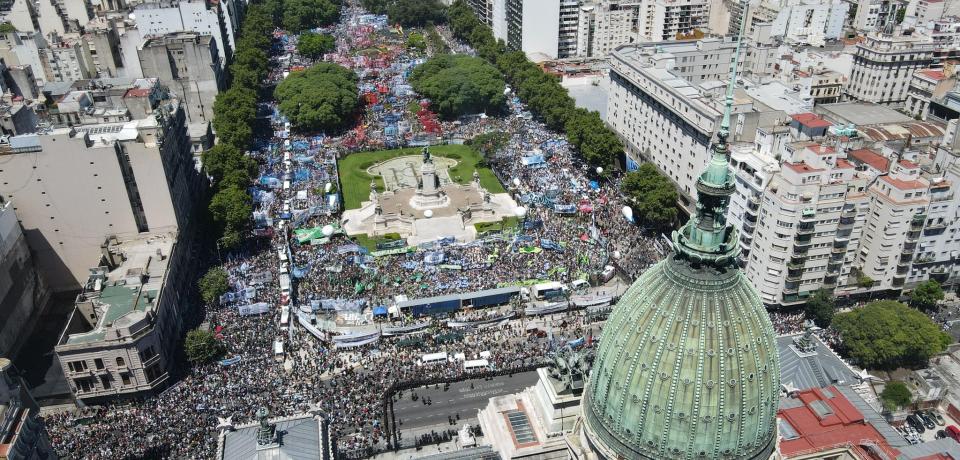
On January 24, in Argentina, the first general strike took place against the ultra-liberal and reactionary government of Javier Milei . Organized barely a month after he took office, this day of strike and mobilization expresses firm opposition from the workers' movement to the first counter-reforms in terms of labuor law and democratic rights hitherto guaranteed by the country's Constitution.
Milei 's first measures include: a devaluation by more than 100 per cent of the currency, an increase in taxes and the liberalization of many markets (notably real estate), which have already led to a price increase of more than 40 per cent as well as inflation that does not fall below 25 per cent a month; measures which have already hit hard workers (40 per cent of whom work in the informal sector) and the middle classes.
Privatizations and crushing of the working classes
Indeed, with a Decree of Necessity and Emergency (DNU, which could be described as the Argentine equivalent of 49.3 in France) and an “omnibus” law (package of laws), the government wants to get round hundreds of laws which, until present, regulated labour relations, the right to strike, the right to free expression and demonstration, as well as the concentration of ownership of the media, businesses and land.
The government also seeks to amplify and extend its powers, in an almost dictatorial manner, in order to apply its austerity programme, which has dramatic consequences on the living and working conditions of the working classes. This provides for the privatization of state-controlled companies, including the national hydrocarbon company YPF, atomic power plants (three in the country) and more than 40 companies in strategic sectors (aviation, research, energy, transport, communication, etc.).
Milei ’s project
The strike movement, initiated by trade union and social organizations - " piqueteros ", organizations of working-class neighbourhoods, human rights groups, the political left, the Peronist front party "Union por la Patria " (Union for the Fatherland) - constitute a form of pressure for the National Congress (National Assembly) to refuse to adopt the decree and the package of laws.
At this stage, it is not possible to know the level of participation in the strike, but we know that it had a considerable impact on transport, the hospital sector, public services and air traffic. Although it was strongly supported by many unions, the strike was not overwhelming. The demonstrations, on the other hand, set the pace for this movement, with hundreds of thousands of people throughout the country, the largest number concentrated in the capital where the slogan "Argentina does not sell itself" resonated in front of the Congress building. These slogans were widely taken up in the speeches and songs of the demonstrators, who urged elected officials to vote against “the ley motosierra ” (the chainsaw law, proposing a reversal of the symbol used by the ultra-liberal candidate during the campaign).
The presence of the “ Madres de Plaza de Mayo” (the mothers of those who disappeared during the military dictatorship), a symbol of resistance, helped to provide a strong symbolic charge to the demonstration.
Continue to build the reltaionship of forces
After this crucial demonstration of strength in numbers, several judges declared the unconstitutionality of certain articles of the law, in particular those which directly attack labour rights. They also cancelled the proposed increase in transport fares, which also led to a postponement of the law for a week in order to allow the government to secure a now uncertain majority. At the same time, the “soft” oppositions (including some of the Peronist deputies) are preparing to vote for a law which is rejected by the immense majority of the population.
The relationship of forces is established, but it is necessary to continue pushing to tip the scales decisively in favour of the working class.